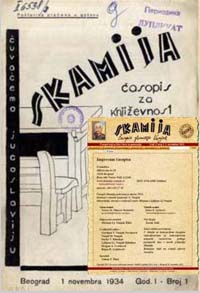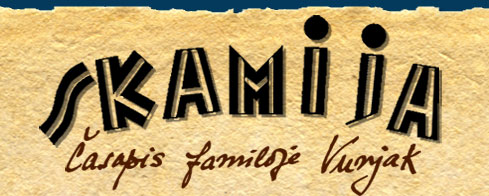WHY SKAMIJA ONLINE?
When the idea of a relaunch of Skamija – a magazine from 1934 – was first born, it was necessary to decide which format would be adopted and whether it should appear as a traditional magazine in print, with texts and illustrations, table of contents and perhaps an index (of titles, authors, illustrations etc.), or as an offspring of modern online journalism that distributes its content via electronic technologies.

If we tried to more precisely define this new form of journalism,the most likely answer would be that it is only a derived form of traditional journalism characterized by certain specific traits of electronic publishing. Online journalism is a modern form of journalism which aims to satisfy the following criteria:
- exclusivity – journalistic articles are written specifically for the online media
- online – existing content is taken from other media, adapted or edited and enriched with hyperlinks to similar content and wider context on the Internet
- promptness – information appears first on a media outlet's website, and is later carried by other electronic or print media
It is possible to differentiate several subcategories of online journalism:
- true online media offers articles and photographs, as well video and audio recordings, that are purpose-made exclusively for online users and this content cannot be seen, heard or read in a different media format
- online versions of print or electronic media, which constitute a transformed version of an existing traditional media outlet that is made available on the Internet using appropriate electronic formats
- hybrid versions, including both already published texts and those that are exclusive (e.g. expanded and modified versions etc.)
The editorial team of the revived Skamija magazine has decided to create a true online magazine characterized by a continuous dynamic relationship between the content of the magazine and its readers. This approach offers the advantage of overcoming temporal and spatial barriers – the electronic format can be read at any time and from any place in the world, and it is possible to access the content from the current and archived issues of the magazine. The online format of the magazine supports usage of all forms of electronic content, including texts, pictures, audio and video recordings, integrating hypertext, multimedia and interactivity through a skillful web design.
Communication between readers and the editorial team, on the one hand, and between contributors and the editorial team, on the other hand, is quick and efficient thanks to web services, most of all e-mail and Skype. Contributions, suggestions, corrections and advice can be exchanged without limitations of time and space, which is an important precondition required to successfully edit the magazine and attract readers and is now the modus vivendi of Skamija Online.
 |
||
Translated by Bojan R. Golubović |
Татјана Филиповић Радулашки |


